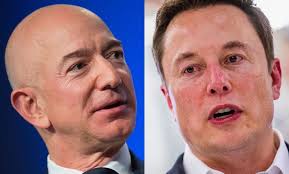In the private aerospace sector, the U.S. Department of Defense (DoD) has selected Elon Musk’s SpaceX and Jeff Bezos’ Blue Origin to compete for national security space mission contracts over the next five years.
This marks the first time Bezos’ company has been included in such a competitive process. Additionally, Boeing and Lockheed Martin’s joint venture, United Launch Alliance (ULA), has also been selected to vie for these important contracts.

The opportunity for these three companies to bid for contracts comes as part of the third phase of the National Security Space Launch (NSSL) program, a framework established to ensure the U.S. military has reliable access to space.
The U.S. Space Force, which oversees military operations in space, announced that while the current pool of awardees is limited, they anticipate expanding it in the future as more rocket manufacturers develop their capabilities.
Brigadier General Kristin Panzenhagen of the Space Force stated, “As we anticipated, the pool of awardees is small this year because many companies are still maturing their launch capabilities.” She emphasized that the strategy includes opportunities for new participants to enter the market each year, which will foster increased competition and diversity among space launch providers.
SpaceX has established itself as a leader in this domain, having secured 22 missions from the Pentagon since 2020, totaling $2.5 billion. Conversely, ULA has won contracts for 26 missions worth $3.1 billion. However, only a single mission from these contracts has successfully launched to date—SpaceX’s Falcon Heavy rocket, which deployed two military communication satellites in January 2023.
Musk’s SpaceX has been a focal point of both excitement and controversy recently. On June 6, the company achieved a significant milestone by successfully launching its Starship spacecraft, a fully reusable megarocket designed for missions to the Moon and Mars.
This launch was particularly notable as it followed three previous failures. However, SpaceX is also facing legal challenges; a group of former engineers has filed a lawsuit alleging wrongful termination after they raised concerns about workplace issues, including allegations of sexual harassment.
The inclusion of Musk’s and Bezos’ companies in national security contracts reflects a broader trend within the Pentagon to leverage the capabilities of major technology firms. Between 2019 and 2022,
The DoD and intelligence agencies awarded contracts worth approximately $53 billion to various tech companies. Notably, in 2021, the National Security Agency awarded a $10 billion contract to Amazon to migrate its intelligence and surveillance data to the cloud.
As these tech titans prepare to compete for critical national security missions, the implications of their involvement extend beyond mere business interests. With their vast resources and technological expertise, companies like SpaceX and Blue Origin could play pivotal roles in shaping the future of U.S. military operations in space.
While some may welcome this shift toward privatization and innovation in national security, others express concerns about the risks of outsourcing vital defense operations to private entities. As the Pentagon looks toward the future, the balance between leveraging private sector innovation and maintaining national security will be essential in navigating this new era of space exploration and defense.
The competitiveness for national security space missions is evolving, with Musk and Bezos at the forefront. Their involvement could revolutionize how the U.S. approaches its military operations in space, ushering in a new age of public-private partnerships.



